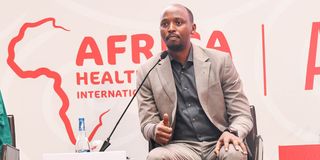Allow teens access contraceptives, Rwanda Health minister tells Kenya

Rwanda’s Health Minister Dr Sabin Nsanzimana.
Kigali, Rwanda
Rwanda’s Health Minister Dr Sabin Nsanzimana has urged Kenya to allow teens to access contraceptives as Africa works towards building resilient health systems.
Dr Nsanzimana spoke during the ongoing Africa Health Agenda International Conference (AHAIC) 2023.
Speaking to the Nation during last month’s African Union Summit 2023 in Addis Ababa, Ethiopia, Kenya’s Health Cabinet Secretary Susan Nakhumicha said teens should not be given contraceptives.
“We have to teach our adolescents to abstain from sex,” the CS said.
Her sentiments came after the Joint United Nations Programme on HIV/AIDS (UNAIDS) executive director Winnie Byanyima said that it is time Kenya allows teenagers to access contraceptives.
Also read: What world needs to do to end Aids
“ Increasing access isn’t just about putting clinics and making contraceptives available, it’s more than that, it’s about safe spaces where girls and young women can feel safe, have the privacy that they need and also have the choice of the method they want to protect themselves from infections, HIV and sexually transmitted infections (STI’s).
This is not happening for every girl and every woman,” the UNAIDS boss told the Nation in an exclusive interview.
While responding to queries fielded by the Nation over Health CS Susan Nakhumicha’s refusal to allow teenagers access contraceptives despite putting their HIV infection rate at 42 per cent a fortnight ago during the African Union summit, Dr Nsanzimana said HIV infections among young people are on the rise and that something needs to be done.
“On contraceptive access and faith, it is a debate and sometimes the best way to debate something is to approach it from a scientific perspective, this is what we have been doing in Rwanda. In the use of condoms and other contraceptives, we always find a solution.
If you approach it from a behavioural and social aspect, it may be difficult but for a fact, science will always find ways,” Dr Nsanzimana told Nation.Africa.
He explained how Rwanda dealt with this similar situation.
“In the past, faith-based supported clinics said we can’t issue contraceptives in their facilities but they allowed us to put posts 10 meters away from their clinics, which offered a solution without us fighting each other.”
Dr Nsanzimana further highlighted that like young people in Kenya, Rwandan youths living with HIV/AIDs are also defaulting on antiretroviral therapy.
“Africa has the highest burden of HIV, things don’t work the same in all age groups with some having much more infection rates while not complying with treatments like antiretroviral therapy which is why we see more resistance to treatment,” he said.
“I hope the new modes of HIV treatment will help. Experts have been working on the possibility of those living with HIV getting one injection in January and one in July, this will offer a solution when it comes to compliance,” he added.
This story was produced as part of AHAIC 2023 media scholarship programme, a journalism fellowship organised by Amref Health Africa.





